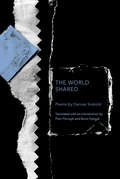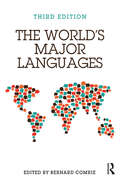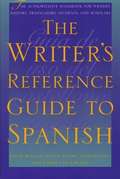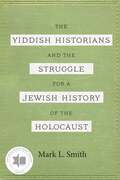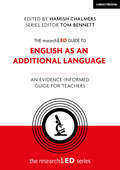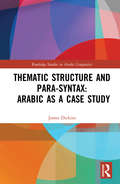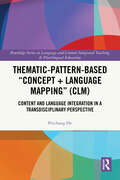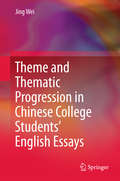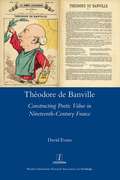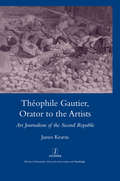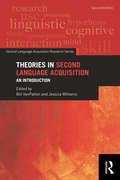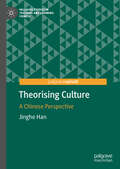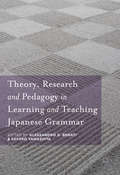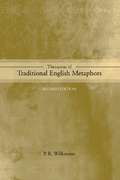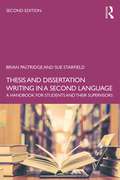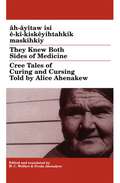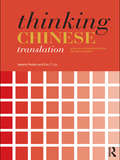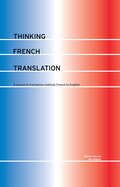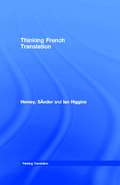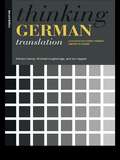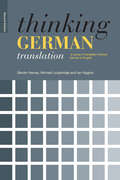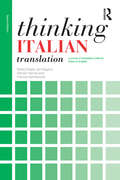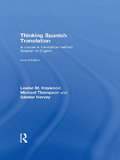- Table View
- List View
The World Shared (Lannan Translations Selection Series)
by Dariusz SosnickiDariusz Sosnicki's poems open our eyes to the sublime just beneath the surface of the mundane: a train carrying children away from their parents for summer vacation turns into a ravenous monster; a meal at a Chinese restaurant inspires a surreal journey through the zodiac; a malfunctioning printer is a reminder of the ghosts that haunt us no matter where we find ourselves.Among the perpetrators and victims,buzzed or wasted to the bone,gliding without their blinkers onin the ruts of the national fate—they're not at home.Dariusz Sosnicki is an award-winning poet, essayist, and editor in Poland.
The World's Major Languages
by Bernard ComrieThe World's Major Languages features over 50 of the world's languages and language families. This revised edition includes updated bibliographies for each chapter and up-to-date census figures. The featured languages have been chosen based on the number of speakers, their role as official languages and their cultural and historical importance. Each language is looked at in depth, and the chapters provide information on both grammatical features and on salient features of the language's history and cultural role. The World’s Major Languages is an accessible and essential reference work for linguists.
The Writer's Reference Guide to Spanish
by David William Foster Daniel Altamiranda Carmen De UriosteWriters and editors of Spanish have long needed an authoritative guide to written language usage, similar to The MLA Style Manual and The Chicago Manual of Style. And here it is! This reference guide provides comprehensive information on how the Spanish language is copyedited for publication. The book covers these major areas:- Language basics: capitalization, word division, spelling, and punctuation. - Language conventions: abbreviations, professional and personal titles, names of organizations, and nationalities. - Bibliographic format, particularly how Spanish differs from English. - Spanish language forms of classical authors' names. - Literary and grammatical terminology. - Linguistic terminology. - Biblical names and allusions. - A dictionary of grammatical doubts, including usage, grammatical constructions of particular words and phrases, verbal irregularities, and gender variations.
The Yiddish Historians and the Struggle for a Jewish History of the Holocaust
by Mark L. SmithThe Yiddish Historians and the Struggle for a Jewish History of the Holocaust identifies the Yiddish historians who created a distinctively Jewish approach to writing Holocaust history in the early years following World War II. Author Mark L. Smith explains that these scholars survived the Nazi invasion of Eastern Europe, yet they have not previously been recognized as a specific group who were united by a common research agenda and a commitment to sharing their work with the worldwide community of Yiddish-speaking survivors. These Yiddish historians studied the history of the Holocaust from the perspective of its Jewish victims, focusing on the internal aspects of daily life in the ghettos and camps under Nazi occupation and stressing the importance of relying on Jewish sources and the urgency of collecting survivor testimonies, eyewitness accounts, and memoirs. With an aim to dispel the accusations of cowardice and passivity that arose against the Jewish victims of Nazism, these historians created both a vigorous defense and also a daring offense. They understood that most of those who survived did so because they had engaged in a daily struggle against conditions imposed by the Nazis to hasten their deaths. The redemption of Jewish honor through this recognition is the most innovative contribution by the Yiddish historians. It is the area in which they most influenced the research agendas of nearly all subsequent scholars while also disturbing certain accepted truths, including the beliefs that the earliest Holocaust research focused on the Nazi perpetrators, that research on the victims commenced only in the early 1960s and that Holocaust study developed as an academic discipline separate from Jewish history. Now, with writings in Yiddish journals and books in Europe, Israel, and North and South America having been recovered, listed, and given careful discussion, former ideas must yield before the Yiddish historians’ published works. The Yiddish Historians and the Struggle for a Jewish History of the Holocaust is an eye-opening monograph that will appeal to Holocaust and Jewish studies scholars, students, and general readers.
The researchED Guide to English as an Additional Language: An evidence-informed guide for teachers (researchED)
by Tom Bennett Hamish ChalmersIn this edition, Hamish Chalmers provides a primer on the key questions teachers and researchers have about the education of children learning English as an Additional Language (EAL). From the general implications of teaching children in a language that many are still in the process of learning, to the specifics of EAL-friendly pedagogy, this volume includes contributions from both teachers and researchers in the field: Victoria Murphy, Constant Leung, Jonathan Bifield, Feyisa Demie, Ann-Margaret Smith, Naomi Flynn, Holly Joseph, Tracey Costley, Xiao Lan Curdt-Christiansen, and Eowyn Crisfield.Hamish Chalmers is a lecturer and EAL researcher at the University of Oxford, vice-chair of NALDIC — the UK’s EAL subject association — and erstwhile primary school teacher, both in the UK and overseas.
The researchED Guide to English as an Additional Language: An evidence-informed guide for teachers (researchED)
by Tom Bennett Hamish ChalmersIn this edition, Hamish Chalmers provides a primer on the key questions teachers and researchers have about the education of children learning English as an Additional Language (EAL). From the general implications of teaching children in a language that many are still in the process of learning, to the specifics of EAL-friendly pedagogy, this volume includes contributions from both teachers and researchers in the field: Victoria Murphy, Constant Leung, Jonathan Bifield, Feyisa Demie, Ann-Margaret Smith, Naomi Flynn, Holly Joseph, Tracey Costley, Xiao Lan Curdt-Christiansen, and Eowyn Crisfield.Hamish Chalmers is a lecturer and EAL researcher at the University of Oxford, vice-chair of NALDIC — the UK’s EAL subject association — and erstwhile primary school teacher, both in the UK and overseas.
Thematic Structure and Para-Syntax: Arabic As A Case Study (Routledge Studies in Arabic Linguistics)
by James DickinsThematic Structure and Para-Syntax: Arabic as a Case Study presents a structural analysis of Arabic, providing an alternative to the traditional notions of theme and rheme. Taking Arabic as a case study, this book claims that approaches to thematic structure propounded in universalist linguistic theories, of which Hallidayan systemic functional linguistics is taken as an illustrative example, are profoundly wrong. It argues that in order to produce an analysis of thematic structure and similar phenomena which is not undermined by its own theoretical presuppositions, it is necessary to remove such notions from the domain of linguistic and semiotic theory. The book initially focuses on Sudanese Arabic, because this allows for a beautifully clear exposition of general principles, before applying these principles to Modern Standard Arabic, and some other Arabic varieties. This book will be of interest to scholars in Arabic linguistics, linguistic theory, and information structure.
Thematic-Pattern-Based “Concept + Language Mapping”: Content and Language Integration in a Transdisciplinary Perspective (Routledge Series in Language and Content Integrated Teaching & Plurilingual Education)
by Peichang HeThis book explores the issue of “integration” in content and language integrated learning (CLIL), and addresses the need for effective content and language integration by proposing the thematic-pattern-based “Concept+Language Mapping” (CLM) approach.Peichang He explores effective integration of content and language learning during the instruction of content subjects using students’ additional language as the medium of instruction. The volume introduces the contextual background of a large-scale school-university collaboration CLIL research project and builds the conceptual framework of a thematic-pattern-based CLM pedagogy by drawing on the language-based theory of learning (Halliday, 1993), the construct of thematic patterns (Lemke, 1990), and the recent development of genre-based pedagogy (Lin, 2016; Rose & Martin, 2012). The research probes the design of thematic-pattern-based CLM teaching resources and examines the impact of the CLM pedagogy on students’ development of language and content knowledge during their learning of different junior and senior English Medium Instructed subjects. The author enhances the conceptual framework based on the ongoing research findings and the burgeoning literature on translanguaging practice (García & Li, 2014; Lemke & Lin, 2022; Lin, 2019) and proposes a trans-disciplinary plurilingual thematic-pattern-based CLM approach. The book concludes with a discussion on some promising future research orientations including a transdisciplinary plurilingual thematic-pattern-based CLM approach for CLIL sustainability, catering for learner diversity in CLIL, and teacher professional development in thematic-pattern-based CLM practice. The book shows readers the design of CLM materials and activities which are demonstrated through classroom interactions in lessons of different subjects and grades for students of diverse cognitive abilities and linguistic backgrounds.This insightful volume will be of interest to researchers and trainee teachers exploring pedagogical approaches to CLIL, plurilingual, and transdisciplinary education and will provide pedagogical implications for teachers of both language and content subjects in schools worldwide.
Theme and Thematic Progression in Chinese College Students' English Essays
by Jing WeiThis book focuses on how instruction affects English learners' use of Theme and thematic progression (thematic organization). While thematic organization in learner English has been extensively studied, little research has been done to investigate the effects of instruction on the use of Theme and thematic progression. Adopting a Systemic Functional Grammar approach, this study explores how a ten-week instruction on thematic organization affects Chinese college students' use of Theme and thematic progression by comparing their English essays before and after the instruction, with native-speaker essays as the research baseline. Second-language acquisition researchers, curriculum developers and foreign language teachers will find this book useful as it not only presents a clear and detailed report of how Chinese college students learn to make better thematic choices, but also provides a well-developed instructional package on Theme and thematic progression.
Theodore De Banville: Constructing Poetic Value in Nineteenth-century France
by David EvansTheodore de Banville (1823-1891) was a prolific poet, dramatist, critic and prose fiction writer whose significant contribution to poetic and aesthetic debates in nineteenth-century France has long been overlooked. Despite his profound influence on major writers such as Baudelaire, Rimbaud, Verlaine and Mallarme, Banville polarised critical opinion throughout his fifty-year career. While supporters championed him as a virtuoso of French verse, many critics dismissed his formal pyrotechnics, effervescent rhythms and extravagant rhymes as mere clowning. This book explores how Banville's remarkably coherent body of verse theory and practice, full of provocative energy and mischievous humour, shaped debates about poetic value and how to identify it during a period of aesthetic uncertainty caused by diverse social, economic, political and artistic factors. It features a detailed new reading of Banville's most infamous and misunderstood text, the Petit Traitede poesie francaise, as well as extended analyses of verse collections such as Les Stalactites, Odes funambulesques, Les Exiles, Trente-six Ballades and Rondels, illuminated by wide reference to Banville's plays, fiction and journalism. Evans elucidates not only aesthetic tensions at the heart of nineteenth-century French verse, but also a centuries-old tension between verse mechanisms and an unquantifiable, mysterious and elusive poeticity which emerges as one of the defining narratives of poetic value from the Middle Ages, via the Grands Rhetoriqueurs and Dada, to the experiments of the OuLiPo and beyond.
Theophile Gautier, Orator to the Artists: Art Journalism of the Second Republic
by James Kearns"Theophile Gautier a envoye avec un feuilleton plus de trois mille personnes dans latelier de M. Ingres, wrote Champfleury in 1848. For artists, critics and readers alike, Gautier was the essential figure in French art journalism in the mid-nineteenth century. During the short-lived but pivotal period of the Second Republic, when the new administration was committed to reforming all the institutions of the fine arts, Gautier deployed the full resources of his brilliant, flexible and authoritative writing to support and direct these developments in ways compatible with his commitment to an idealist aesthetic, itself under growing pressure from alternative trends in an increasingly competitive art market. This first study of all Gautiers art journalism written during the Second Republic provides a long overdue reassessment of Gautiers importance in French nineteenth-century visual culture."
Theories in Second Language Acquisition: An Introduction (2nd Edition)
by Jessica Williams Bill VanPattenThe second edition of Theories in Second Language Acquisition seeks to build on the strengths of the first edition by surveying the major theories currently used in second language acquisition research. This volume is an ideal introductory text for undergraduate and graduate students in SLA and language teaching. Each chapter focuses on a single theory, written by a leading scholar in the field in an easy-to-follow style – a basic foundational description of the theory, relevant data or research models used with this theory, common misunderstandings, and a sample study from the field to show the theory in practice. This text is designed to provide a consistent and coherent presentation for those new to the field who seek basic understanding of theories that underlie contemporary SLA research. Researchers will also find the book useful as a "quick guide" to theoretical work outside their respective domains.
Theorising Culture: A Chinese Perspective (Palgrave Studies in Teaching and Learning Chinese)
by Jinghe HanThis book seeks for an alternative perspective in analysing cultural phenomena to supplement the norm of Western dominant theorising and conceptualisation. It engages notions and concepts of culture developed by Chinese cultural theorists when addressing Chinese teachers’ cross-cultural experiences in Australian school settings. This alternative approach acknowledges the fact that the generation and development of cultural theories is contextually based. Through the reciprocated theory-data examination, it enables the arguments: Chinese culture is rooted in its written language (hanzi) which makes culture inseparable from language teaching; the core of the culture is linked back to, streamlined with and continues from China’s elongated history; this core has been consistently influential on these teachers’ practices and the observable cultural shift in them could be non-genuine mimicry for survival. Document analysis witnesses the current political push for the culture’s stability and continuity through the national education system across sectors. This book provides background information for teachers with cultural backgrounds different from their students’, and draws on a bank of practice-based evidence to suggest ways to enhance teacher-student relationships in cross-cultural settings.
Theory, Research and Pedagogy in Learning and Teaching Japanese Grammar
by Alessandro G. Benati Sayoko YamashitaThis edited book focuses on the role of different types of pedagogical solutions in the acquisition of the Japanese grammatical system by reviewing, assessing and measuring current theory and research. Findings from this research have implications for the way Japanese grammar is learned and taught in a classroom context. The editors and contributors address a number of questions around the role of Japanese grammar learning and teaching such as: what is the role of instruction in Japanese second language acquisition? What are the main findings of empirical research into the acquisition of Japanese grammar? Is any one particular pedagogical intervention or solution to the teaching of Japanese grammar more effective than another? What pedagogical options do we have for the teaching of Japanese grammar? This book offers a unique insight into its practical implications for Japanese language learning and teaching for applied linguists, researchers, language teaching professionals and curriculum developers alike.
Thesaurus of Traditional English Metaphors
by P.R. WilkinsonThis fascinating collection of traditional metaphors and figures of speech, groups expressions according to theme. The second edition includes over 1,500 new entries, more information on first known usages, a new introduction and two expanded indexes. It will appeal to those interested in cultural history and the English language.
Thesis and Dissertation Writing in a Second Language: A Handbook for Students and their Supervisors
by Brian Paltridge Sue StarfieldFully updated and packed with new material, the second edition of Thesis and Dissertation Writing in a Second Language is the ideal guide for non-native speaker students and their supervisors working on writing a thesis or dissertation in English. Considering the purposes of thesis and dissertation of writing alongside writer/reader relationships, this book uses accessible language and practical examples to discuss issues that are crucial to successful thesis and dissertation writing. This edition offers: Insights into the experience of being a doctoral writer, issues of writer identity and writing with authority Typical language and discourse features of theses and dissertations Advice on the structure and organisation of key sections Suggestions for online resources which support writing Extracts from completed theses and dissertations Guidance on understanding examiner expectations Advice on publishing from a PhD Suitable for students from all disciplines, Thesis and Dissertation Writing in a Second Language is essential reading for non-native speaker students looking to complete a thesis or dissertation in English.
They Knew Both Sides of Medicine: Cree Tales of Curing and Cursing Told by Alice Ahenakew (Algonquian Text Society)
by H. C. Wolfart Freda AhenakewBorn in 1912, Alice Ahenakew was brought up in a traditional Cree community in north-central Saskatchewan. As a young woman, she married Andrew Ahenakew, a member of the prominent Saskatchewan family, who later became an Anglican clergyman and a prominent healer. Alice Ahenakew's personal reminiscences include stories of her childhood, courtship and marriage, as well as an account of the 1928 influenza epidemic and encounters with a windigo. The centrepiece of this book is the fascinating account of Andrew Ahenakewís bear vision, through which he received healing powers. Written in original Cree text with a full English translation, They Knew both Sides of Medicine also includes an introduction discussing the historical background of the narrative and its style and rhetorical structure, as well as a complete Cree-English glossary.
Thinking Chinese Translation: Chinese to English
by Valerie Pellatt Eric T. LiuThinking Chinese Translation is a practical and comprehensive course for advanced undergraduates and postgraduate students of Chinese. Thinking Chinese Translation explores the ways in which memory, general knowledge, and creativity (summed up as ‘schema’) contribute to the linguistic ability necessary to create a good translation. The course develops the reader’s ability to think deeply about the texts and to produce natural and accurate translations from Chinese into English. A wealth of relevant illustrative material is presented, taking the reader through a number of different genres and text types of increasing complexity including: technical, scientific and legal texts journalistic and informative texts literary and dramatic texts. Each chapter provides a discussion of the issues of a particular text type based on up-to-date scholarship, followed by practical translation exercises. The chapters can be read independently as research material, or in combination with the exercises. The issues discussed range from the fine detail of the text, such as punctuation, to the broader context of editing, packaging and publishing translations. Major aspects of teaching and learning translation, such as collaboration, are also covered. Thinking Chinese Translation is essential reading for advanced undergraduate and postgraduate students of Chinese and translation studies. The book will also appeal to a wide range of language students and tutors through the general discussion of the principles and purpose of translation.
Thinking French Translation (Thinking Translation)
by Ian Higgins Sándor HerveyThe new edition of this popular course in translation from French into English offers a challenging practical approach to the acquisition of translation skills, with clear explanations of the theoretical issues involved. A variety of translation issues are considered including:*cultural differences*register and dialect*genre*revision and editing.The course now covers texts from a wide range of sources, including:*journalism and literature*commercial, legal and technical texts*songs and recorded interviews.This is essential reading for advanced undergraduates and postgraduate students of French on translation courses. The book will also appeal to wide range of language students and tutors.A tutors' handbook offering invaluable guidance on how to use the text is available for free download at http://www.routledge.com/cw/thinkingtranslation/
Thinking French Translation: A Course In Translation Method-french To English (Thinking Translation)
by Ian Higgins Sándor HerveyThe new edition of this popular course in translation from French into English offers a challenging practical approach to the acquisition of translation skills, with clear explanations of the theoretical issues involved. A variety of translation issues are considered including:*cultural differences*register and dialect*genre*revision and editing.The course now covers texts from a wide range of sources, including:*journalism and literature*commercial, legal and technical texts*songs and recorded interviews.This is essential reading for advanced undergraduates and postgraduate students of French on translation courses. The book will also appeal to wide range of language students and tutors.
Thinking German Translation: A Course in Translation Method (Thinking Translation)
by Ian Higgins Sándor Hervey Michael Loughridge Mr Ian HigginsThinking German Translation is a comprehensive and revolutionary 20-week course in translation method offering a challenging and entertaining approach to the acquisition of translation skills. It has been fully and successfully piloted at the University of St.Andrews.Translation is presented as a problem-solving discipline. Discussion, examples and a full range of exercise work enable students to acquire the skills necessary for a broad range of translation problems.Examples are drawn from a wide variety of material from technical and commercial texts to poetry and song.Thinking German Translation is essential reading for advanced undergraduates and postgraduate students of German. The book will also appeal to a wide range of languages students and tutors through the general discussion of principles, purposes and practice of translation.
Thinking German Translation: Teacher's Handbook (Thinking Translation)
by Ian Higgins Sandor Hervey Michael LoughridgeThis is a comprehensive practical course in translation for advanced students of German, which focuses on improving translation quality whilst clarifying the theoretical issues involved. This second edition brings the course up-to-date, and has been fully reworked to give clearer explanations of key terms and include revised chapters on genre, compensation and revision and editing. Based on detailed analysis of translation problems, Thinking German Translation features new material taken from a wide range of sources, including: business and politics press and publicity engineering tourism literary and consumer-oriented texts. Addressing a variety of translation issues such as cultural difference, register and dialect, Thinking German Translation is essential reading for all students wishing to perfect their translation skills. It is also an excellent foundation for those considering a career in translation. Further resources, including a free teacher's handbook for the course, are available on the companion website at http://cw.routledge.com/textbooks/0415341469/resources/default.asp
Thinking Italian Translation: A course in translation method: Italian to English (Thinking Translation)
by Ian Higgins Sándor Hervey Stella Cragie Patrizia GambarottaThinking Italian Translation is an indispensable course for students who want to develop their Italian to English translation skills. This new edition includes: up-to-date examples and new source texts from a variety of genres, from journalistic to technical. a brand new section on professionalism and the translation market The course is practical, addressing key issues for translators such as cultural differences, genre, and revision and editing. At the same time, it clearly defines translation theories. Thinking Italian Translation is key reading for advanced students wishing to perfect their language skills or considering a career in translation.
Thinking Spanish Translation: A Course in Translation Method: Spanish to English (Thinking Translation)
by Michael Thompson Louise Haywood Sándor HerveyThe new edition of this comprehensive course in Spanish-English translation offers advanced students of Spanish a challenging yet practical approach to the acquisition of translation skills, with clear explanations of the theoretical issues involved. A variety of translation issues are addressed, including: cultural differences register and dialect grammatical differences genre. With a sharper focus, clearer definitions and an increased emphasis on up-to-date ‘real world’ translation tasks, this second edition features a wealth of relevant illustrative material taken from a wide range of sources, both Latin American and Spanish, including: technical, scientific and legal texts journalistic and informative texts literary and dramatic texts. Each chapter includes suggestions for classroom discussion and a set of practical exercises designed to explore issues and consolidate skills. Model translations, notes and suggestions for teaching and assessment are provided in a Teachers’ Handbook; this is available for free download at http://www.routledge.com/cw/thinkingtranslation/ Thinking Spanish Translation is essential reading for advanced undergraduate and postgraduate students of Spanish and translation studies. The book will also appeal to a wide range of language students and tutors through the general discussion of the principles and purposes of translation.
